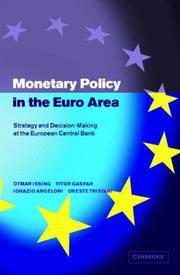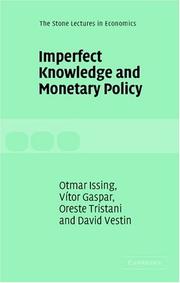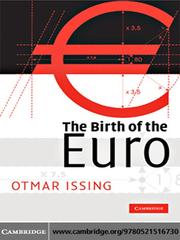| Listing 1 - 10 of 16 | << page >> |
Sort by
|
Book
ISBN: 3515063072 9783515063074 Year: 1993 Volume: 1993/1 Publisher: Stuttgart: Steiner,
Abstract | Keywords | Export | Availability | Bookmark
 Loading...
Loading...Choose an application
- Reference Manager
- EndNote
- RefWorks (Direct export to RefWorks)
Banks and banking, Central --- Banks of issue --- Money --- Monetary policy --- -Banks of issue --- -Monetary policy --- -Money --- -Currency --- Monetary question --- Money, Primitive --- Specie --- Standard of value --- Exchange --- Finance --- Value --- Banks and banking --- Coinage --- Currency question --- Gold --- Silver --- Silver question --- Wealth --- Monetary management --- Economic policy --- Currency boards --- Money supply --- Banker's banks --- Banks, Central --- Central banking --- Central banks --- -Banks and banking, Central --- Banks and banking, Central - Germany. --- Banks of issue - Germany. --- Money - Germany. --- Monetary policy - Germany.

ISBN: 0521783240 0521788889 0511118791 0511041012 0511153449 0511327900 0511492456 1280159200 0511046413 1107120888 9780511041013 9780511118791 9780511492457 9780511046414 9780511153440 9781280159206 9786610159208 6610159203 9780521783248 9780521788885 9781107120884 9780511327902 Year: 2001 Publisher: Cambridge, UK New York Cambridge University Press
Abstract | Keywords | Export | Availability | Bookmark
 Loading...
Loading...Choose an application
- Reference Manager
- EndNote
- RefWorks (Direct export to RefWorks)
How and for whose benefit the European Central Bank (ECB) will work is the most important issue facing Europe, and has been the subject of vast media and academic interest which has already spawned a vast literature of discussion papers in the academic literature, and 'Euro Watch' features. Much of this discussion has been of an increasingly hysterical and political nature and has served to blur rather than inform. This book, written by a team at the ECB, including Otmar Issing the ECB's Chief Economist, provides the first comprehensive, inside, non-technical analysis of the monetary policy strategy, institutional features and operational procedures of the Eurosystem. The goals and the transmission mechanism of monetary policy are explored, as are the theoretical and empirical results underpinning the 'stability-oriented monetary policy strategy' adopted by the ECB. The characteristics of this strategy are also discussed in comparison with suggested alternatives.
Monetary policy --- European Central Bank --- Monetary policy. --- Monetary policy - Europe. --- Money --- Finance --- Business & Economics --- European Central Bank. --- Monetary management --- Economic policy --- Currency boards --- Money supply --- ECB --- Banque centrale européenne --- BCE --- Banco Central Europeo --- Banca centrale europea --- Europäische Zentralbank --- Európska centrálna banka --- E-books --- -banque centrale europeenne --- politique monetaire --- union europeenne --- EEC / European Union - EU -Europese Unie - Union Européenne - UE --- 334.151.1 --- 334.151.21 --- 333.820 --- -Monetary policy --- -332.494 --- Ue5.2 --- europese centrale bank --- monetair beleid --- europese unie --- EG : economisch en monetair beleid. --- Europese centrale bank. ESCB. Centrale banken. --- Geldbeleid, bankbeleid en kredietbeleid: algemeenheden. --- Business, Economy and Management --- Economics --- 332.494 --- banque centrale europeenne --- Geldbeleid, bankbeleid en kredietbeleid: algemeenheden --- EG : economisch en monetair beleid --- Europese centrale bank. ESCB. Centrale banken --- EZB --- BUSINESS & ECONOMICS --- Electronic books --- Monetaire politiek --- Europese Centrale Bank --- Euro --- Europese Unie --- Geldpolitik --- Aufsatzsammlung --- Politique mon etaire --- Zone euro --- Money & Monetary Policy --- Europ aische Zentralbank. --- Banque centrale europ eenne. --- Europ aische Union. --- Europa --- Pol itica monetaria. --- Banco Central Europeo. --- Monetary policy - Europe

ISBN: 9780521854863 9780521671071 9780511492426 0511169159 9780511169151 0511168721 9780511168727 0511492421 9780511168277 0511168276 9786610436927 6610436924 0511167741 9780511167744 0521671078 0521854865 1107155150 1280436921 0511311893 Year: 2005 Publisher: Cambridge, UK New York Cambridge University Press
Abstract | Keywords | Export | Availability | Bookmark
 Loading...
Loading...Choose an application
- Reference Manager
- EndNote
- RefWorks (Direct export to RefWorks)
Based on lectures given as part of The Stone Lectures in Economics, this book discusses the problem of formulating monetary policy in practice, under the uncertain circumstances which characterize the real world. The first lecture highlights the limitations of decision rules suggested by the academic literature and recommends an approach involving, first, a firm reliance on the few fundamental and robust results of monetary economics and, secondly, a pragmatic attitude to policy implementation, taking into consideration lessons from central banking experience. The second lecture revisits Milton Friedman's questions about the effects of active stabilization policies on business cycle fluctuations. It explores the implications of a simple model where the policy maker has imperfect knowledge about potential output and the private sector forms expectations according to adaptive learning. This lecture shows that imperfect knowledge limits the scope for active stabilization policy and strengthens the case for conservatism.
AA / International- internationaal --- 333.846.0 --- Monetary policy --- 332.46 --- Monetary management --- Economic policy --- Currency boards --- Money supply --- Verband tussen het monetair, bank- en kredietbeleid en de economische ontwikkeling: algemeenheden. --- Verband tussen het monetair, bank- en kredietbeleid en de economische ontwikkeling: algemeenheden --- BUSINESS & ECONOMICS --- Politique mon etaire --- Monetaire politiek --- Onzekerheid --- Geldtheorie --- Unvollkommene Information --- Geldpolitik --- Unsicherheit --- Money & Monetary Policy --- E-books --- Monetary policy. --- Economic policy. --- Economic nationalism --- Economic planning --- National planning --- State planning --- Economics --- Planning --- National security --- Social policy --- Business, Economy and Management
Book
ISBN: 3428437985 3428037987 Year: 2022 Publisher: Berlin : Duncker & Humblot,
Abstract | Keywords | Export | Availability | Bookmark
 Loading...
Loading...Choose an application
- Reference Manager
- EndNote
- RefWorks (Direct export to RefWorks)
Book
ISBN: 3428443055 3428043057 Year: 2022 Publisher: Berlin : Duncker & Humblot,
Abstract | Keywords | Export | Availability | Bookmark
 Loading...
Loading...Choose an application
- Reference Manager
- EndNote
- RefWorks (Direct export to RefWorks)
Book
ISBN: 3800623285 Year: 1998 Publisher: München : Vahlen,
Abstract | Keywords | Export | Availability | Bookmark
 Loading...
Loading...Choose an application
- Reference Manager
- EndNote
- RefWorks (Direct export to RefWorks)
Book
Year: 1970 Publisher: Erlangen : Universitätsbund,
Abstract | Keywords | Export | Availability | Bookmark
 Loading...
Loading...Choose an application
- Reference Manager
- EndNote
- RefWorks (Direct export to RefWorks)
Book
Year: 1975 Publisher: Vandenhoeck +& Ruprecht
Abstract | Keywords | Export | Availability | Bookmark
 Loading...
Loading...Choose an application
- Reference Manager
- EndNote
- RefWorks (Direct export to RefWorks)
Book
ISBN: 3800611422 Year: 1987 Publisher: München Verlag C.H. Beck/Verlag Franz Vahlen
Abstract | Keywords | Export | Availability | Bookmark
 Loading...
Loading...Choose an application
- Reference Manager
- EndNote
- RefWorks (Direct export to RefWorks)
Economics --- #A9301A --- Economie en handel --- woordenboeken --- woordenboeken.

ISBN: 9780521731867 9780521516730 0521731860 0521516730 9780511754111 9780511429804 0511429800 9780511426667 0511426666 0511429428 9780511429422 0511754116 9780511427626 051142762X 1107191025 1281791326 9786611791322 0511428235 0511428944 9780511428234 Year: 2008 Publisher: Cambridge, UK New York Cambridge University Press
Abstract | Keywords | Export | Availability | Bookmark
 Loading...
Loading...Choose an application
- Reference Manager
- EndNote
- RefWorks (Direct export to RefWorks)
Today, 318 million people in 15 countries use the Euro, which now rivals the importance of the US Dollar in the world economy. This is an outcome that few would have predicted with confidence when the Euro was launched. How can we explain this success and what are the prospects for the future? There is nobody better placed to answer these questions than Otmar Issing, who as a founding member of the Executive Board of the European Central Bank (1998-2006), was one of the Euro's principal architects. His story is a unique insider account, combining personal memoir with reference to the academic and policy literature. Free of jargon, this is a very human reflection on a unique historical experiment and a key reference for all academics, policy makers, and 'Eurowatchers' seeking to understand how the Euro has got to where it is today and what challenges lie ahead.
Monetary unions
---
Monetary policy
---
Euro
---
Eurozone
---
Unions monétaires
---
Politique monétaire
---
Euro (Monnaie)
---
Zone euro
---
European Central Bank
---
Europe
---
Economic integration
---
Intégration économique
---
Euro area
---
262 Europese economische en monetaire politiek
---
EEC / European Union - EU -Europese Unie - Union Européenne - UE
---
334.151.20
---
334.151.21
---
334.151.25
---
339.7
| Listing 1 - 10 of 16 | << page >> |
Sort by
|

 Search
Search Feedback
Feedback About UniCat
About UniCat  Help
Help News
News